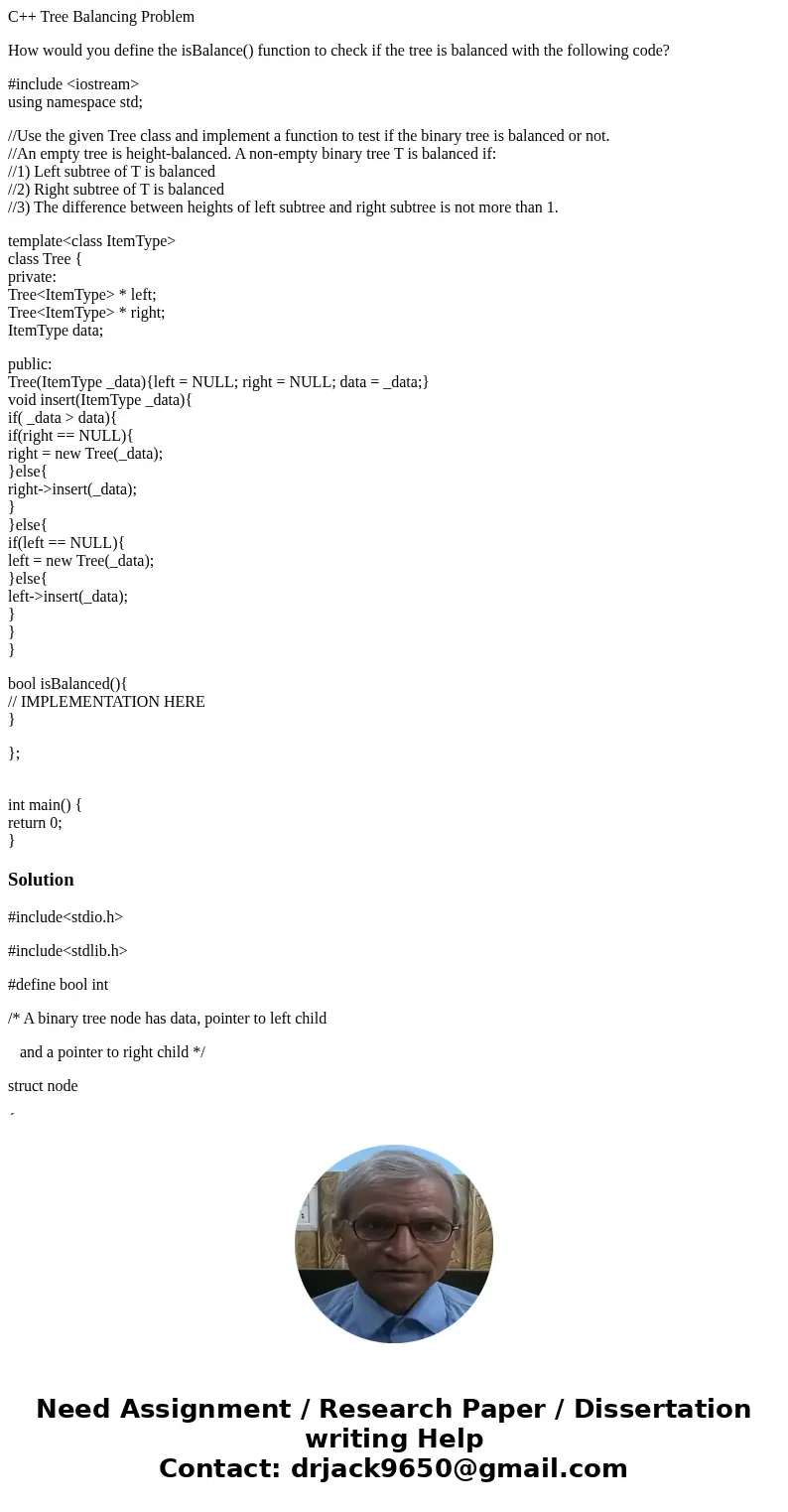C Tree Balancing Problem How would you define the isBalance
C++ Tree Balancing Problem
How would you define the isBalance() function to check if the tree is balanced with the following code?
#include <iostream>
using namespace std;
//Use the given Tree class and implement a function to test if the binary tree is balanced or not.
//An empty tree is height-balanced. A non-empty binary tree T is balanced if:
//1) Left subtree of T is balanced
//2) Right subtree of T is balanced
//3) The difference between heights of left subtree and right subtree is not more than 1.
template<class ItemType>
class Tree {
private:
Tree<ItemType> * left;
Tree<ItemType> * right;
ItemType data;
public:
Tree(ItemType _data){left = NULL; right = NULL; data = _data;}
void insert(ItemType _data){
if( _data > data){
if(right == NULL){
right = new Tree(_data);
}else{
right->insert(_data);
}
}else{
if(left == NULL){
left = new Tree(_data);
}else{
left->insert(_data);
}
}
}
bool isBalanced(){
// IMPLEMENTATION HERE
}
};
int main() {
return 0;
}
Solution
#include<stdio.h>
#include<stdlib.h>
#define bool int
/* A binary tree node has data, pointer to left child
and a pointer to right child */
struct node
{
int data;
struct node* left;
struct node* right;
};
/* Returns the height of a binary tree */
int height(struct node* node);
/* Returns true if binary tree with root as root is height-balanced */
bool isBalanced(struct node *root)
{
int lh; /* for height of left subtree */
int rh; /* for height of right subtree */
/* If tree is empty then return true */
if(root == NULL)
return 1;
/* Get the height of left and right sub trees */
lh = height(root->left);
rh = height(root->right);
if( abs(lh-rh) <= 1 &&
isBalanced(root->left) &&
isBalanced(root->right))
return 1;
/* If we reach here then tree is not height-balanced */
return 0;
}
/* UTILITY FUNCTIONS TO TEST isBalanced() FUNCTION */
/* returns maximum of two integers */
int max(int a, int b)
{
return (a >= b)? a: b;
}
/* The function Compute the \"height\" of a tree. Height is the
number of nodes along the longest path from the root node
down to the farthest leaf node.*/
int height(struct node* node)
{
/* base case tree is empty */
if(node == NULL)
return 0;
/* If tree is not empty then height = 1 + max of left
height and right heights */
return 1 + max(height(node->left), height(node->right));
}
/* Helper function that allocates a new node with the
given data and NULL left and right pointers. */
struct node* newNode(int data)
{
struct node* node = (struct node*)
malloc(sizeof(struct node));
node->data = data;
node->left = NULL;
node->right = NULL;
return(node);
}
int main()
{
struct node *root = newNode(1);
root->left = newNode(2);
root->right = newNode(3);
root->left->left = newNode(4);
root->left->right = newNode(5);
root->left->left->left = newNode(8);
if(isBalanced(root))
printf(\"Tree is balanced\");
else
printf(\"Tree is not balanced\");
getchar();
return 0;
}




 Homework Sourse
Homework Sourse